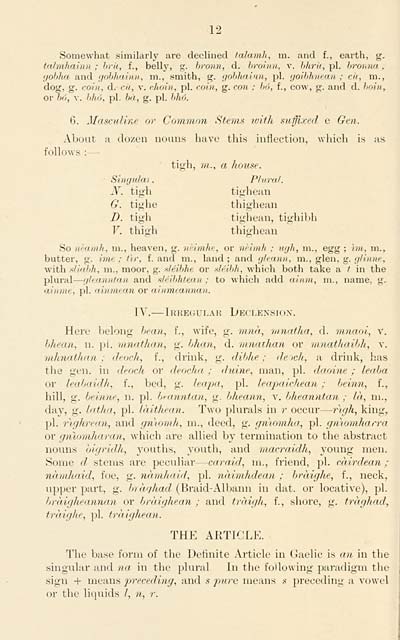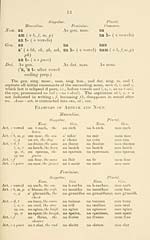Download files
Complete book:
Individual page:
Thumbnail gallery: Grid view | List view

12
Somewhat similarly are declined taiamh, m. .ind f., earth, g.
tahnhainn ; hrii, f., belly, g. hronn, d. in-oiini, v. lilirit, pi. Iironna .
'johha and Qohhainn, m., smith, g. (/olthainn, pi. ijoiithnean : cii, m.,
dog, g. ro/«, d. rii, V. rJioiìì, pi. ro*», g. co)i .• /«i, f., cow, g. and d. hoin,
or iio, V. /</;<;. pi. /;/(, g. pi. hho.
ti. Masculine or Common Sfem>t luith suffixed e Geii.
About ;i dozen nouns have this inflection, which is as.
follows : —
tigh, m., a house.
SÌHijukiì . Plural.
N. tigh tighean
G. tighe thighean
D. tigh tighean, tighibh
V. thigh thighean
So ìf'-aiiììi, m., heaven, g. nèimhe, or nèimli : nyh, m., egg ; ìììi, m.,
butter, g. imr- : fir, f. and m., land; and (jh-ann, m., glen, g. ijliimc,
with sliidih, m., moor, g. sleihhe or .s/dibh, which both take a / in the
plural — ijli'iii/if'iii. and ■sl'-Uikteaii : to which add (dnm, m., name, g.
aiiitiii:, {)1. <ùìtmi(t,n or (ilitmcauiiaii.
IV. — lUHEGULAH IjECI-ENSION.
Here belong hcdii, f., wife, g. w?i/V, hinatlia, d. mnaoi, v.
hln'on, \\. pi. iiniiithnìi, g. /;/<(//;, d. innaxluin or mnathaibli, v.
viUwit/iiiit : (h-nfh, f., drink, g. dihhe : <ie icli, a drink, has
tiie gen. in (/ror7< or thorJut .• duint', man, pi. daoine ; leaha
or Leabaidh. f., bed, g. ii-itpa, pi. lecqiaickean ; heinn, f.,
hill, g. beinne, n. pi. bfanatan, g. bheann, x. bheanntan ; la, m.,
day, g. /(<</i!a, pi. làithean. Two plurals in r occur — r-t^rA, king,
pi. righrean, and gniomh, m., deed, g. gmomha, pi. gniomkarra
or gnlomharan, which are allied by termination to the abstract
nouns Itigrldlt, youths, youth, and macraidh, young men.
Some r/ steins are peculiar — cnraid, m., friend, pi. chirdean :
nà/mhaid, foe, g. nhmhaid, pi. nhimhdean ; bràighe, f., neck,
upper part, g. brh^jhad (Braid-Albann in dat. or locative), pi.
bringlwannan or hrùighean ; and trnigh, f., shore, g. tràghad,
frdighc, pi. tràighean.
thp: article.
The base form of the Definite Article in Gaelic is an in the
singiilar and na in the plural In the foUowing paradigm the
sign + means ]jreceding, and s pure means s preceding a vowel
or the liipiids /, n, r.
Somewhat similarly are declined taiamh, m. .ind f., earth, g.
tahnhainn ; hrii, f., belly, g. hronn, d. in-oiini, v. lilirit, pi. Iironna .
'johha and Qohhainn, m., smith, g. (/olthainn, pi. ijoiithnean : cii, m.,
dog, g. ro/«, d. rii, V. rJioiìì, pi. ro*», g. co)i .• /«i, f., cow, g. and d. hoin,
or iio, V. /</;<;. pi. /;/(, g. pi. hho.
ti. Masculine or Common Sfem>t luith suffixed e Geii.
About ;i dozen nouns have this inflection, which is as.
follows : —
tigh, m., a house.
SÌHijukiì . Plural.
N. tigh tighean
G. tighe thighean
D. tigh tighean, tighibh
V. thigh thighean
So ìf'-aiiììi, m., heaven, g. nèimhe, or nèimli : nyh, m., egg ; ìììi, m.,
butter, g. imr- : fir, f. and m., land; and (jh-ann, m., glen, g. ijliimc,
with sliidih, m., moor, g. sleihhe or .s/dibh, which both take a / in the
plural — ijli'iii/if'iii. and ■sl'-Uikteaii : to which add (dnm, m., name, g.
aiiitiii:, {)1. <ùìtmi(t,n or (ilitmcauiiaii.
IV. — lUHEGULAH IjECI-ENSION.
Here belong hcdii, f., wife, g. w?i/V, hinatlia, d. mnaoi, v.
hln'on, \\. pi. iiniiithnìi, g. /;/<(//;, d. innaxluin or mnathaibli, v.
viUwit/iiiit : (h-nfh, f., drink, g. dihhe : <ie icli, a drink, has
tiie gen. in (/ror7< or thorJut .• duint', man, pi. daoine ; leaha
or Leabaidh. f., bed, g. ii-itpa, pi. lecqiaickean ; heinn, f.,
hill, g. beinne, n. pi. bfanatan, g. bheann, x. bheanntan ; la, m.,
day, g. /(<</i!a, pi. làithean. Two plurals in r occur — r-t^rA, king,
pi. righrean, and gniomh, m., deed, g. gmomha, pi. gniomkarra
or gnlomharan, which are allied by termination to the abstract
nouns Itigrldlt, youths, youth, and macraidh, young men.
Some r/ steins are peculiar — cnraid, m., friend, pi. chirdean :
nà/mhaid, foe, g. nhmhaid, pi. nhimhdean ; bràighe, f., neck,
upper part, g. brh^jhad (Braid-Albann in dat. or locative), pi.
bringlwannan or hrùighean ; and trnigh, f., shore, g. tràghad,
frdighc, pi. tràighean.
thp: article.
The base form of the Definite Article in Gaelic is an in the
singiilar and na in the plural In the foUowing paradigm the
sign + means ]jreceding, and s pure means s preceding a vowel
or the liipiids /, n, r.
Set display mode to: Large image | Transcription
Images and transcriptions on this page, including medium image downloads, may be used under the Creative Commons Attribution 4.0 International Licence unless otherwise stated. ![]()
| Early Gaelic Book Collections > Blair Collection > How to learn Gaelic > (22) |
|---|
| Permanent URL | https://digital.nls.uk/79789318 |
|---|
| Description | A selection of books from a collection of more than 500 titles, mostly on religious and literary topics. Also includes some material dealing with other Celtic languages and societies. Collection created towards the end of the 19th century by Lady Evelyn Stewart Murray. |
|---|
| Description | Selected items from five 'Special and Named Printed Collections'. Includes books in Gaelic and other Celtic languages, works about the Gaels, their languages, literature, culture and history. |
|---|

